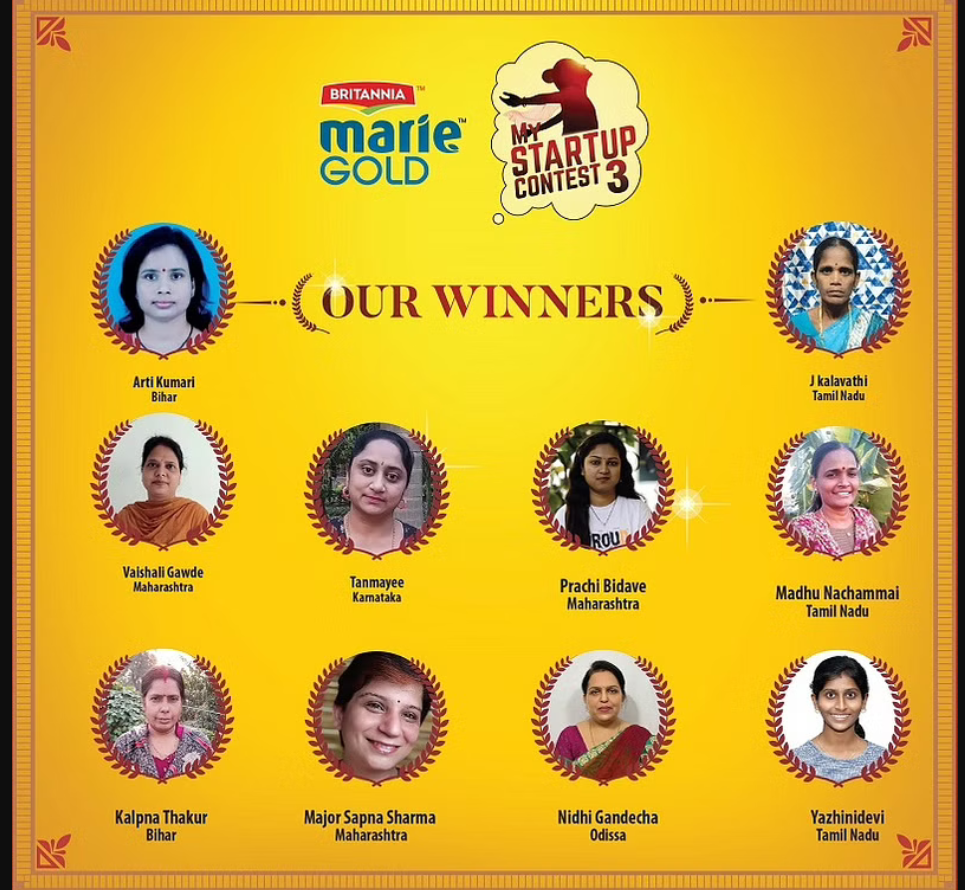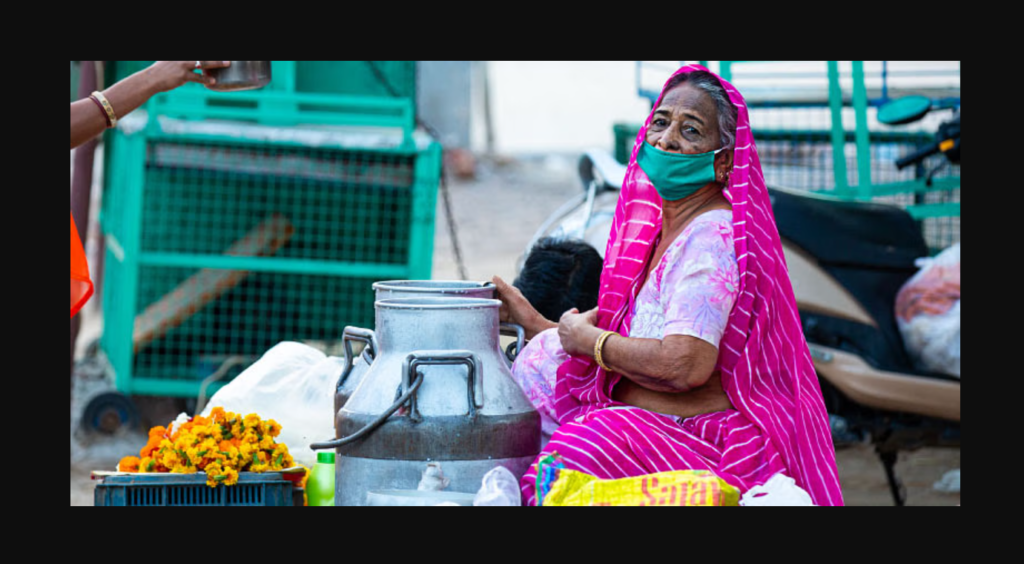First launched in 2019, this annual initiative for homepreneurs has announced the winners of the 2022 competition. In this two-part feature, we share jury insights and winner profiles.
Britannia Marie Gold, the third largest biscuit brand in India, has completed three seasons of its annual women entrepreneurship initiative, My Startup. Ten winners each year are awarded Rs 10 lakh each to kick-start their business ventures.
YourStory was part of the external jury for the shortlisted entries of the 2022 competition, along with Rashmi Bansal (author of 10 best-selling books on entrepreneurship, and Visiting Professor at Ashoka University), Sairee Chahal, Founder of SHEROES and Mahila Money, Renu Shah (Founder of Shakti – The Empathy Project, an incubation programme for women social entrepreneurs), and Aakanksha Bhargava (CEO and President of PM Relocations).
Other jurors were Aarti Mohan, Ruchika Bhuwalka, Latha Chandramuli and Piya Bahadur. The jury also included members of the leadership team from Britannia.

Edition 2022
The 1.3 million entries this year came from across the length and breadth of India. The largest number of entries were from Maharashtra, Tamil Nadu and West Bengal.
In Season 3, the Britannia Marie Gold My Startup campaign has been broadened to help women leverage the internet to grow their businesses. All participants have been provided free access to a set of Google’s digital and business skilling resources in six languages – Hindi, Telugu, Tamil, Kannada, Bengali and English.
“77 percent of women who desire to set up their own ventures, consider technology as an enabler in this journey, as noted in a survey by Britannia and Momspresso,” explains Amit Doshi, CMO Britannia Industries, in a chat with YourStory.
“In 2020, a partnership with NSDC helped the entrepreneurship campaign provide 10,000 women with basic communication skills, financial literacy through access to information and communication technology (ICT), along with micro entrepreneurial skills for social and economic self-reliance,” he adds.
2022 winners
The 10 winners this year are from Orissa, Maharashtra, Tamil Nadu, Karnataka, and Bihar. The founders’ ages range from 21 to 46.
The winners include Nidhi Gandecha (digital services for rural India), Major Sapna Sharma (Retired) (aqua farming on barren/fallow land), Kalavathi J (dairy farming), Yazhinidevi (skill development), and Tanmayee R Kalebar (StoriesByChildren.com).
Other winners are Kalpna Thakur (dairy farm with good quality cattle), Arti Kumari (ophthalmological care through mobile vans), Prachi Rohan Bidave (food and bakery brand), Vaishali Gawde (Marathi language learning app for kids and non-Maharashtrians), and Madhu Nachammal SL (beauty and skincare products made of banana plantation).
Competitions and awards
“Entrepreneurship competitions build the confidence of participants, and bring them prestige and respect. More so in the case of women who are sometimes not taken that seriously by the family,” observes bestselling author Rashmi Bansal.
“Entrepreneurship competitions can be great platforms that recognise entrepreneurs and businesses solving some of the big, real problems in the world today,” observes Sairee Chahal, Founder of SHEROES and Mahila Money.
They drive visibility, conversations and opportunity, and serve as a great motivation for founders and their teams. “Having said that, I think we can build more platforms to recognise women micro-entrepreneurs, who are also playing their role in raising the GDP, and bringing solutions and opportunities to their communities,” she adds.
“These competitions work as triggers and encourage women to take their first steps towards entrepreneurship. Currently, only 14 percent of entrepreneurs in India are women and competitions like this can go a long way in building the ecosystem,” affirms Renu Shah of STEP.
“I feel that any kind of recognition is always wonderful to have, and it reassures you of the work you have been doing. But if one doesn’t win awards and recognition, it does not mean that one is not doing good work. It also depends on the direction and the kind of work one is doing,” explains Aakanksha Bhargava of PM Relocations.
Startup competitions offer participants the opportunity to converse with and be mentored by industry experts. “Hence, being a part of an entrepreneurship competition provides one with the perfect mix of visibility, opportunity, and the scope to evaluate one’s challenges,” she adds.
Impact
“The idea behind Britannia Marie Gold My Startup is to support women entrepreneurs steadily and systematically. We are playing the role of a catalyst,” Amit explains.
Most of the winners from both earlier seasons have reportedly set up their businesses and have started seeing good results. “We hope to see a similar development this year as well, with our participants having more confidence and training,” Amit says.
“Through this initiative, Britannia has witnessed further strengthening of its leadership position over the past three seasons. Britannia Marie Gold has witnessed strong double digit growth along with an increase in household penetration,” he explains.
With the current season, new homepreneurs have been added to the entrepreneurial world. “We see every woman who has taken her first step towards her entrepreneurial journey as a winner in the making,” he enthuses.

Gender barriers
The jurors also identify a number of barriers faced by women entrepreneurs, and suggest ways of overcoming these challenges.
“Managing home and family remains the No.1 challenge for women entrepreneurs. Low self-confidence and lack of support from the family is another issue,” Rashmi Bansal notes.
“Women also need to become more comfortable with handling money. Gradually, things are changing for the better. The women we met on the Britannia platform certainly impressed me with their zeal, their knowledge of the business and desire to grow it,” she adds.
“In addition to the challenges that all entrepreneurs face, women also face lack of support, skilling opportunity, traditional mindsets, and poor access to capital and mentorship. Things are beginning to shift but I would say there is a long way to go,” Renu Shah observes.
Sairee Chahal cites limited access to skilling, capital/credit, peer community networks, and mentorship as some challenges. “But the ecosystem is getting stronger and more focused on their needs,” she observes.
Aakanksha Bhargava points to lack of leadership trust and work-life balance as other challenges. Access to mentors and funding are issues as well. “Another key concern is the lack of education and nurturing support offered to women,” she adds.
Amit cites the Sixth Economic Census in India, according to which women only constitute 13.76 percent of the total entrepreneurs. That amounts to only 8.05 million out of the 58.5 million entrepreneurs in the country.
“For women starting a business, the degree of risk involved is higher,” Amit explains. He cites inherent conscious and unconscious gender biases, lack of support from the family, societal and familial expectations around household responsibilities, inadequate access to finance, and lack of networking opportunities and technical skills, among others.
According to the Britannia Marie Gold Women Entrepreneurship Survey 2021, financial independence was a key reason for women to start their own businesses. Among the many challenges mentioned, 53 percent of women cite a lack of guidance, 50 percent lack sufficient funds, and 73 percent see a lack of time due to home responsibilities as a concern, Amit explains.

Pandemic impact
The pandemic has adversely impacted MSMEs, who are estimated to contribute nearly one-third of India’s GDP. “It also unleashed a tidal wave of entrepreneurial activity across the country from women that choose to support their families,” Amit observes.
“The adoption and acceptance of digital assets has been a dominant trend. This has propelled the use of contactless payment methods, opened up new markets, and ignited a hiring spree amongst digitally enabled startups,” he adds
The pandemic has spurred collaboration between government, startups, civil society, and educational institutions. Examples include C-CAMP COVID-19 Innovation Development Accelerator (C-CIDA) for startups in diagnostics, respiratory devices, therapeutics, and cold chain technology.
“The pandemic has also led to an increased focus on socially committed enterprises which focused on pain areas faced by sectors because of the pandemic-induced distress,” Amit explains. Such sectors include agriculture, healthcare, and sanitation. He cites localisation, self-reliance and local employment as other trends.

Tips and recommendations
The campaign team also shared some tips for aspiring entrepreneurs, and recommendations for government and industry to further spur the startup movement.
“Stay focused, relevant, be ambitious and perseverant with your dreams. Hard work and teamwork will help you scale greater heights. A vision without a mission may not be an ideal way to pursue entrepreneurship aspirations,” Amit advises.
He calls for greater government support to plug the gender gap in entrepreneurship. “While government initiatives such as ‘Startup India, Stand-up India’ have helped to facilitate the growth of startups, corporates and other influential parties need to do their own bit to enable this change,” he adds, inviting other organisations to join the My Startup initiative.
The road ahead
“We are optimistic about the future. Many experts have been increasingly vocal about how women hold the key to unlocking the country’s full growth potential,” Amit says.
Amit cites a recent report by World Economic Forum which highlights how the pandemic has stalled and worsened parity in opportunities available to the female population.
“We strongly believe when women move forward, entire family progresses. And when families progress, the country progresses. Empowering India’s women is not a choice, it is an absolute necessity,” Amit signs off.
Article Credits: YS
